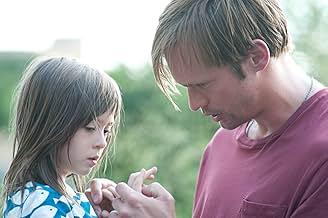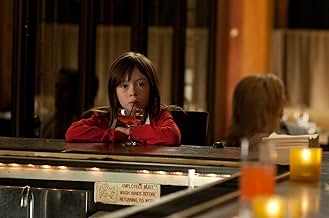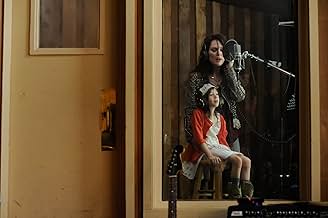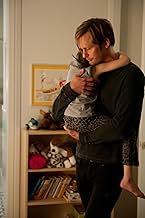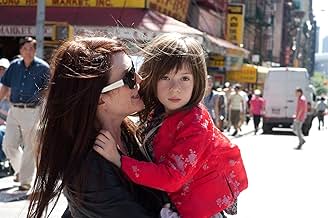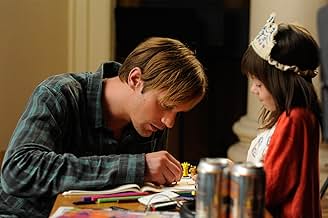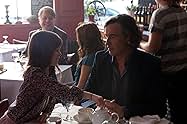VALUTAZIONE IMDb
7,4/10
29.079
LA TUA VALUTAZIONE
A New York City, una giovane ragazza viene colta nel mezzo dell'aspra battaglia per la custodia dei suoi genitori.A New York City, una giovane ragazza viene colta nel mezzo dell'aspra battaglia per la custodia dei suoi genitori.A New York City, una giovane ragazza viene colta nel mezzo dell'aspra battaglia per la custodia dei suoi genitori.
- Regia
- Sceneggiatura
- Star
- Premi
- 3 vittorie e 8 candidature totali
Jesse Stone Spadaccini
- Martin
- (as Jesse Spadaccini)
Diana García
- Cecelia
- (as Diana Garcia Soto)
Recensioni in evidenza
10kcfl-1
This is what I hope Henry James would have written, were he alive today. The book is tough sledding, late James when he was dictating his novels (due to tendinitis), and there was no holding him back. At least one Harvard professor called him "the greatest American novelist," but this work is deservedly minor.
The movie was perfect, in the top 1% of all I've seen. The style was the antithesis of James, radical "showing" instead of "telling."
I think the title should have been "What Maisie SAW," but that's too titillating. What she knew or felt only her future therapist will learn. We do have a hint though when her father throws her mother's flowers away, and M explains, "He was allergic."
The movie was perfect, in the top 1% of all I've seen. The style was the antithesis of James, radical "showing" instead of "telling."
I think the title should have been "What Maisie SAW," but that's too titillating. What she knew or felt only her future therapist will learn. We do have a hint though when her father throws her mother's flowers away, and M explains, "He was allergic."
She knew who really loved her and who cared for her...
She also knew that mummy and daddy were too busy arguing to notice that the pizza guy had arrived. "What Maisie Knew" practically opens mid-tirade and Maisie, a wide-eyed six- year old girl has heard it all before, she skips innocently through their art-deco New York apartment, past her none-the-wiser parents, pulls out a fistful of dollar bills from her own piggy-bank and returns to the door to pay for the pizza.
"What Maisie Knew" is a re-visioning of the 19th-Century Henry James novel by the same name. The story follows Maisie, played by the captivating Onata Aprile , caught in the midst of a custody battle between her aging rock star mother Susanna and art-dealer father, Beale.
Susanna intensely played by the always-brilliant Julianne Moore and Beale (Steve Coogan) only unite in their neglect and emotional abandonment of little Maisie, and both of whom are not above using their daughter as a pawn in their war game.
As they battle on with the messy custody arrangements, Beale marries former nanny Margo (Joanna Vanderham), and in retaliation Susanna also remarries, to young bartender Lincoln, (Alexander Skargard).
As Maisie moves between her parents now separate lives, we unearth a natural connection between Maisie and Lincoln. You feel safe when he is around, even though he doesn't know what he is doing half the time and like Maisie, is out of his depth and unsure where he stands in Susanna's life.
Constantly, Susanna relies on Lincoln to pick Maisie up from school, drop her off, and spend time with her and improvise when necessary. But as the affectionate bond between her new husband and her daughter grows, Susanna becomes jealous of the relationship to the point of enforcing to Lincoln "you don't get a bonus for making her like you".
"You don't deserve her," Lincoln lashes out as Susanna breaks up with him, expressing exactly what the viewer has been thinking. But as another relationship in Maisie's life ends, it's her resilience that keeps us captivated and in awe of such a brave girl.
The story is told from Maisie's perspective including many shots even captured from Maisie's eye level so we get a fresh look at an unoriginal story. Instead of finding out why a parent leaves her at school, we just see how the child remembers being left alone. Instead of knowing what the parents are fighting about, we see how it impacts the child and her memories of it.
"What Masie knew" is a bleak film but hopeful, it demonstrates that innocence is not something to be wasted and used but cherished and protected. What Masie knew is to trust the people who actually take care of her - never voicing an allegiance against anyone but accepting love when it's offered
She also knew that mummy and daddy were too busy arguing to notice that the pizza guy had arrived. "What Maisie Knew" practically opens mid-tirade and Maisie, a wide-eyed six- year old girl has heard it all before, she skips innocently through their art-deco New York apartment, past her none-the-wiser parents, pulls out a fistful of dollar bills from her own piggy-bank and returns to the door to pay for the pizza.
"What Maisie Knew" is a re-visioning of the 19th-Century Henry James novel by the same name. The story follows Maisie, played by the captivating Onata Aprile , caught in the midst of a custody battle between her aging rock star mother Susanna and art-dealer father, Beale.
Susanna intensely played by the always-brilliant Julianne Moore and Beale (Steve Coogan) only unite in their neglect and emotional abandonment of little Maisie, and both of whom are not above using their daughter as a pawn in their war game.
As they battle on with the messy custody arrangements, Beale marries former nanny Margo (Joanna Vanderham), and in retaliation Susanna also remarries, to young bartender Lincoln, (Alexander Skargard).
As Maisie moves between her parents now separate lives, we unearth a natural connection between Maisie and Lincoln. You feel safe when he is around, even though he doesn't know what he is doing half the time and like Maisie, is out of his depth and unsure where he stands in Susanna's life.
Constantly, Susanna relies on Lincoln to pick Maisie up from school, drop her off, and spend time with her and improvise when necessary. But as the affectionate bond between her new husband and her daughter grows, Susanna becomes jealous of the relationship to the point of enforcing to Lincoln "you don't get a bonus for making her like you".
"You don't deserve her," Lincoln lashes out as Susanna breaks up with him, expressing exactly what the viewer has been thinking. But as another relationship in Maisie's life ends, it's her resilience that keeps us captivated and in awe of such a brave girl.
The story is told from Maisie's perspective including many shots even captured from Maisie's eye level so we get a fresh look at an unoriginal story. Instead of finding out why a parent leaves her at school, we just see how the child remembers being left alone. Instead of knowing what the parents are fighting about, we see how it impacts the child and her memories of it.
"What Masie knew" is a bleak film but hopeful, it demonstrates that innocence is not something to be wasted and used but cherished and protected. What Masie knew is to trust the people who actually take care of her - never voicing an allegiance against anyone but accepting love when it's offered
I've read five previously posted reviews of this film and see no reason to repeat what they've already said. I agree, for the most part, with the positive ones. And I suspect the negative ones were written by people whose established taste in movies should have steered them away from seeing this one in the first place.
What I'll add is, I guess, a mostly personal perspective. I've found that I am lately much more drawn to smaller, more deeply felt movies than to bigger, slicker, higher-production-value ones. To "What Maisie Knew," for example, than to "The Great Gatsby." Even though both source novels share a similar interior aesthetic, the treatment in the former stays inside the characters, where James focused the original (thus causing one of the previous reviewers' comments to the effect that "nothing happens" in the movie), while the latter (possibly because of Luhrmann's well-established directorial predilections)stays resolutely focused on the exterior spectacle and barely skims the surface of Fitzgerald's deeply rendered characterizations.
If you like smaller, more closely observed and deeply felt films, you'll like this one.
What I'll add is, I guess, a mostly personal perspective. I've found that I am lately much more drawn to smaller, more deeply felt movies than to bigger, slicker, higher-production-value ones. To "What Maisie Knew," for example, than to "The Great Gatsby." Even though both source novels share a similar interior aesthetic, the treatment in the former stays inside the characters, where James focused the original (thus causing one of the previous reviewers' comments to the effect that "nothing happens" in the movie), while the latter (possibly because of Luhrmann's well-established directorial predilections)stays resolutely focused on the exterior spectacle and barely skims the surface of Fitzgerald's deeply rendered characterizations.
If you like smaller, more closely observed and deeply felt films, you'll like this one.
What Maisie Knew (2012)
*** 1/2 (out of 4)
Excellent updating of the Henry James story about a divorcing couple (Julianne Moore, Steve Coogan) and the impact that their behavior has on their young daughter Maisie (Onata Aprile) as well as the new step parents (Alexander Skarsgard, Joanna Vanderham). WHAT MAISIE KNEW isn't going to appeal to a mass audience but it's certainly a terrific little gem from directors Scott McGehee and David Siegel. What I enjoyed the most was the unique way it told the story. We never get the "full" story of everything going on but instead we get the bits and pieces that a child would remember about something. Instead of finding out why a parent leaves her at school, we just see how the child remembers being left alone. Instead of knowing what the parents are fighting about, we see how it impacts the child and her memories of it. This is a very unique way to tell the story and it gives a touch of freshness to a storyline (divorce) that we've seen before. It also doesn't hurt that the film doesn't shy away from some rather ugly behavior from the parents and especially the Moore character. To say she's an unworthy mother would be an understatement but I appreciate the film playing things straight and not ever trying to make something cute. It also doesn't hurt that we get some of the best performances that you're going to see all year with Moore doing an excellent job in her role as the busy mother who doesn't have enough time for her daughter. This is a rather ugly role so it was brave for the actress to take it on. The same with Coogan who also plays a jerk and delivers with some strong work. Both Skarsgard and Vanderham really steal the film in the roles of the step parents who find themselves being forced to deal with something they never expected. Both of them should be remembered at Oscar time but we'll see how that goes. The same is true for Aprile who doesn't get too much dialogue but we constantly see her reactions to the things going on around here. This is such an excellent and quiet performance and something you'd see in a silent movie. WHAT MAISIE KNEW is about a pretty ugly subject matter but it's a fascinating look at it for those who enjoy great performances and a unique story.
*** 1/2 (out of 4)
Excellent updating of the Henry James story about a divorcing couple (Julianne Moore, Steve Coogan) and the impact that their behavior has on their young daughter Maisie (Onata Aprile) as well as the new step parents (Alexander Skarsgard, Joanna Vanderham). WHAT MAISIE KNEW isn't going to appeal to a mass audience but it's certainly a terrific little gem from directors Scott McGehee and David Siegel. What I enjoyed the most was the unique way it told the story. We never get the "full" story of everything going on but instead we get the bits and pieces that a child would remember about something. Instead of finding out why a parent leaves her at school, we just see how the child remembers being left alone. Instead of knowing what the parents are fighting about, we see how it impacts the child and her memories of it. This is a very unique way to tell the story and it gives a touch of freshness to a storyline (divorce) that we've seen before. It also doesn't hurt that the film doesn't shy away from some rather ugly behavior from the parents and especially the Moore character. To say she's an unworthy mother would be an understatement but I appreciate the film playing things straight and not ever trying to make something cute. It also doesn't hurt that we get some of the best performances that you're going to see all year with Moore doing an excellent job in her role as the busy mother who doesn't have enough time for her daughter. This is a rather ugly role so it was brave for the actress to take it on. The same with Coogan who also plays a jerk and delivers with some strong work. Both Skarsgard and Vanderham really steal the film in the roles of the step parents who find themselves being forced to deal with something they never expected. Both of them should be remembered at Oscar time but we'll see how that goes. The same is true for Aprile who doesn't get too much dialogue but we constantly see her reactions to the things going on around here. This is such an excellent and quiet performance and something you'd see in a silent movie. WHAT MAISIE KNEW is about a pretty ugly subject matter but it's a fascinating look at it for those who enjoy great performances and a unique story.
Greetings again from the darkness. An ultra-modern update of the 1897 Henry James novel introduces us to parents we know, but wish we didn't. Steve Coogan plays Beale, a self-absorbed art dealer. Julianne Moore plays Susanna, a self-absorbed rock star. OK, you and I may not know art dealers and rock stars, but we know self-absorbed types and we know they make terrible parents. So not only do we know it, but it's also what Maisie knows.
Five outstanding performances and strong work by co-directors Scott McGhee and David Siegel prevent this one from spinning off into the neverlands of melodramatic muck. Onata Aprile is a wonder as Maisie. She displays none of the typical "movie kid" precociousness. The movie (and James novel) are told from her point of view. We see the fragmented bits and pieces she experiences as her parents fight. Rather than a full story, we share her moments of late pick-ups, early drop-offs and forgotten trips.
Soon enough Beale and Susanna are divorced and the real wars begin. These despicable adults make little effort in hiding their hatred of each other from 6 year old Maisie. It becomes background noise to her life. Further proof of the epic narcissism from both, Beale soon marries Margot the nanny (played by Joanna Vanderham) and Susanna reacts by marrying Lincoln, a band gopher and bartender played by studly Alexander Skarsgard. The most startling moment of the movie occurs when Lincoln first begins playing with Maisie ... it's as if we had almost forgotten what it means to give your attention to a child.
This is not an easy film to watch ... at least if you understand that parenting means putting yourself second. The directors do a wonderful job of showing us how Maisie takes in moments and what memories she makes from these. The neglect and false moments of caring from her parents make her acceptance of the attention to her step-parents even more poignant. We can't help but hope things work out for this little girl and it's a reminder that childhood innocence cannot be recaptured once lost ... and it's worth hanging on to for as long as possible.
Five outstanding performances and strong work by co-directors Scott McGhee and David Siegel prevent this one from spinning off into the neverlands of melodramatic muck. Onata Aprile is a wonder as Maisie. She displays none of the typical "movie kid" precociousness. The movie (and James novel) are told from her point of view. We see the fragmented bits and pieces she experiences as her parents fight. Rather than a full story, we share her moments of late pick-ups, early drop-offs and forgotten trips.
Soon enough Beale and Susanna are divorced and the real wars begin. These despicable adults make little effort in hiding their hatred of each other from 6 year old Maisie. It becomes background noise to her life. Further proof of the epic narcissism from both, Beale soon marries Margot the nanny (played by Joanna Vanderham) and Susanna reacts by marrying Lincoln, a band gopher and bartender played by studly Alexander Skarsgard. The most startling moment of the movie occurs when Lincoln first begins playing with Maisie ... it's as if we had almost forgotten what it means to give your attention to a child.
This is not an easy film to watch ... at least if you understand that parenting means putting yourself second. The directors do a wonderful job of showing us how Maisie takes in moments and what memories she makes from these. The neglect and false moments of caring from her parents make her acceptance of the attention to her step-parents even more poignant. We can't help but hope things work out for this little girl and it's a reminder that childhood innocence cannot be recaptured once lost ... and it's worth hanging on to for as long as possible.
Lo sapevi?
- QuizIn an interview on the NPR program "Fresh Air", Julianne Moore said that she drew on Courtney Love and Patti Smith for inspiration for her character in this movie, who is (like Love and Smith) a rock star who is also a mother.
- ConnessioniFeatured in At the Movies: Episodio #10.26 (2013)
- Colonne sonoreRockabye Baby
Performed by Julianne Moore
I più visti
Accedi per valutare e creare un elenco di titoli salvati per ottenere consigli personalizzati
Dettagli
- Data di uscita
- Paese di origine
- Siti ufficiali
- Lingua
- Celebre anche come
- What Maisie Knew
- Luoghi delle riprese
- The High Line, Manhattan, New York, New York, Stati Uniti(Maisie and Lincoln play at the High Line)
- Aziende produttrici
- Vedi altri crediti dell’azienda su IMDbPro
Botteghino
- Budget
- 6.000.000 USD (previsto)
- Lordo Stati Uniti e Canada
- 1.066.471 USD
- Fine settimana di apertura Stati Uniti e Canada
- 21.480 USD
- 5 mag 2013
- Lordo in tutto il mondo
- 2.711.379 USD
- Tempo di esecuzione
- 1h 39min(99 min)
- Colore
- Mix di suoni
- Proporzioni
- 2.35 : 1
Contribuisci a questa pagina
Suggerisci una modifica o aggiungi i contenuti mancanti







